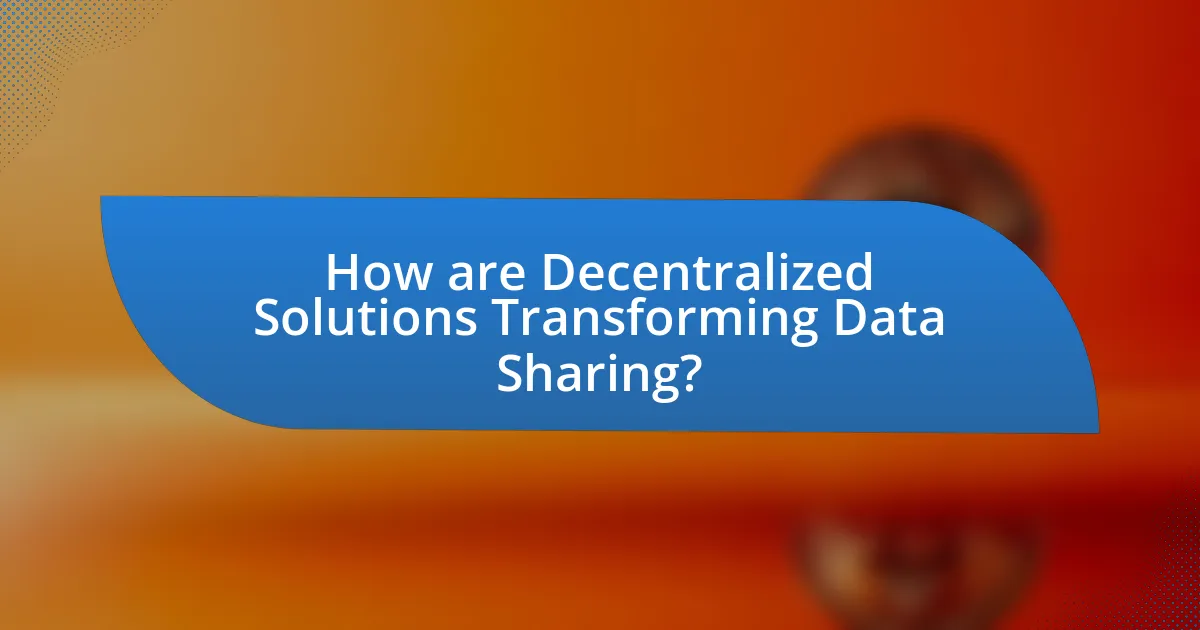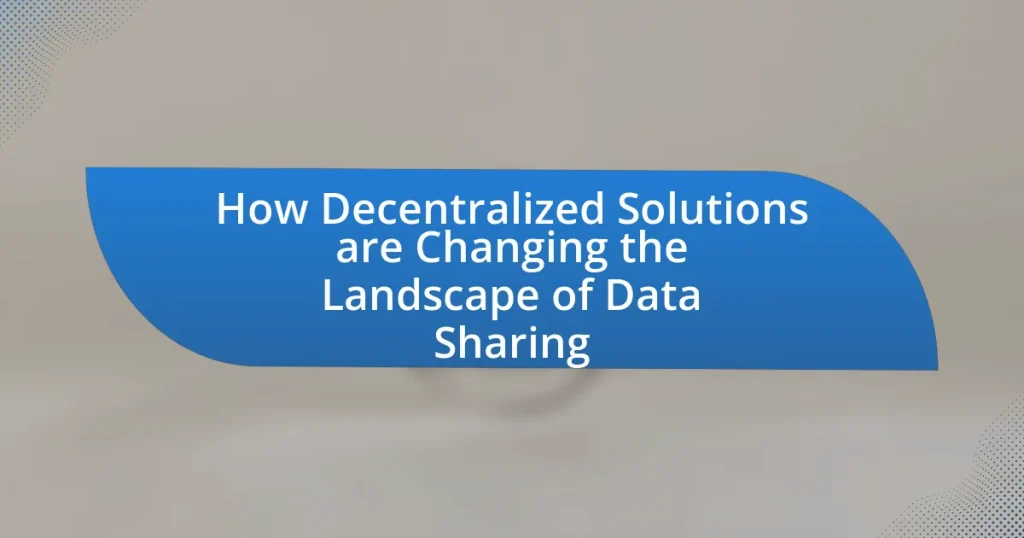Decentralized solutions are fundamentally transforming the landscape of data sharing by enabling direct peer-to-peer interactions that enhance privacy, security, and user control. Key characteristics of these solutions include distributed architecture, transparency, and the use of blockchain technology, which collectively mitigate risks associated with centralized data management. The article explores how decentralized data sharing differs from traditional methods, the technologies that underpin these innovations, and the growing popularity driven by consumer demand for data ownership. Additionally, it addresses the challenges and technical limitations faced by decentralized systems, their impact across various industries, and future trends that may shape the evolution of data sharing practices.

How are Decentralized Solutions Transforming Data Sharing?
Decentralized solutions are transforming data sharing by enabling peer-to-peer interactions that eliminate the need for central authorities. This shift allows individuals and organizations to share data directly, enhancing privacy and security while reducing the risk of data breaches. For instance, blockchain technology facilitates secure transactions and data integrity through immutable records, which has been evidenced by its use in supply chain management to track goods transparently. Additionally, decentralized storage systems, such as IPFS (InterPlanetary File System), allow users to store and share files without relying on a single server, thus improving accessibility and resilience against censorship. These innovations demonstrate how decentralized solutions are fundamentally changing the dynamics of data sharing by prioritizing user control and trust.
What are the key characteristics of decentralized solutions?
Decentralized solutions are characterized by their distributed architecture, which eliminates the need for a central authority. This structure enhances security, as data is stored across multiple nodes, reducing the risk of single points of failure. Additionally, decentralized solutions promote transparency, allowing all participants to verify transactions independently. They also enable greater user control over data, as individuals retain ownership and can decide how their information is shared. Furthermore, decentralized systems often utilize consensus mechanisms, such as blockchain technology, to ensure data integrity and trust among users. These characteristics collectively contribute to a more resilient and equitable data-sharing environment.
How do decentralized solutions differ from traditional data sharing methods?
Decentralized solutions differ from traditional data sharing methods primarily in their architecture and control mechanisms. Traditional data sharing typically relies on centralized servers, where a single entity manages and controls the data, leading to potential vulnerabilities such as data breaches and single points of failure. In contrast, decentralized solutions distribute data across a network of nodes, enhancing security and resilience by eliminating reliance on a single point of control. For instance, blockchain technology exemplifies this difference by allowing multiple participants to validate transactions without a central authority, thereby increasing transparency and trust. This shift not only mitigates risks associated with data centralization but also empowers users with greater control over their own data.
What technologies underpin decentralized data sharing?
Decentralized data sharing is primarily underpinned by blockchain technology, peer-to-peer networks, and distributed ledger technology (DLT). Blockchain provides a secure and transparent way to record transactions, ensuring data integrity and trust among participants without a central authority. Peer-to-peer networks facilitate direct data exchange between users, eliminating intermediaries and enhancing privacy. DLT further supports decentralized data sharing by allowing multiple parties to maintain a synchronized database, ensuring that all participants have access to the same information in real-time. These technologies collectively enable secure, efficient, and transparent data sharing across various applications.
Why is decentralized data sharing gaining popularity?
Decentralized data sharing is gaining popularity due to its ability to enhance security, privacy, and control over personal data. Traditional centralized systems pose risks of data breaches and misuse, while decentralized models distribute data across multiple nodes, reducing single points of failure. According to a report by the World Economic Forum, decentralized technologies can improve data integrity and user trust, as they empower individuals to manage their own information without relying on intermediaries. This shift aligns with growing consumer demand for transparency and data ownership, further driving the adoption of decentralized solutions.
What are the main benefits of decentralized data sharing for users?
Decentralized data sharing offers users enhanced privacy, control, and security over their personal information. By eliminating central authorities, users can manage their data without relying on intermediaries, reducing the risk of data breaches and misuse. Additionally, decentralized systems often employ encryption and blockchain technology, which provide robust security measures that protect user data from unauthorized access. According to a study by the World Economic Forum, decentralized data sharing can lead to a 30% reduction in data-related fraud, further validating the security benefits for users.
How does decentralized data sharing enhance privacy and security?
Decentralized data sharing enhances privacy and security by distributing data across multiple nodes rather than storing it in a central location. This architecture reduces the risk of data breaches, as there is no single point of failure that can be targeted by malicious actors. For instance, in a centralized system, a hacker can compromise one server to access all user data, whereas in a decentralized system, data is fragmented and encrypted, making unauthorized access significantly more difficult. Additionally, decentralized networks often utilize blockchain technology, which provides an immutable record of transactions and enhances accountability, further protecting user privacy.
What challenges do decentralized solutions face in data sharing?
Decentralized solutions face significant challenges in data sharing, primarily due to issues of interoperability, data integrity, and regulatory compliance. Interoperability challenges arise because different decentralized platforms may use varying protocols and standards, making it difficult for them to communicate effectively. Data integrity is a concern as decentralized systems often lack centralized oversight, which can lead to inconsistencies or inaccuracies in shared data. Additionally, regulatory compliance poses a challenge since decentralized solutions must navigate complex legal frameworks that vary by jurisdiction, complicating the sharing of sensitive data. These challenges hinder the seamless and secure exchange of information across decentralized networks.
What are the technical limitations of decentralized data sharing?
Decentralized data sharing faces several technical limitations, including scalability, data integrity, and interoperability. Scalability issues arise because decentralized networks often struggle to handle large volumes of transactions efficiently, leading to slower processing times. For instance, blockchain networks can experience congestion, which affects their ability to scale effectively. Data integrity is another concern, as ensuring that all nodes in a decentralized network have consistent and accurate data can be challenging, particularly when nodes may go offline or become compromised. Interoperability limitations exist because different decentralized systems may not communicate effectively with one another, hindering seamless data exchange across platforms. These limitations highlight the complexities involved in implementing decentralized data sharing solutions.
How do regulatory issues impact decentralized data sharing?
Regulatory issues significantly impact decentralized data sharing by imposing legal constraints that can hinder the free flow of information. For instance, regulations such as the General Data Protection Regulation (GDPR) in Europe require strict compliance regarding data privacy and user consent, which can complicate the implementation of decentralized systems that rely on open data sharing. Additionally, regulatory uncertainty can deter investment in decentralized technologies, as companies may fear potential legal repercussions or the need for costly compliance measures. This creates a challenging environment for innovation, as developers must navigate complex legal landscapes while trying to promote decentralized solutions.
How do decentralized solutions impact various industries?
Decentralized solutions significantly impact various industries by enhancing transparency, security, and efficiency in data sharing. For instance, in the finance sector, blockchain technology enables peer-to-peer transactions without intermediaries, reducing costs and transaction times. According to a report by the World Economic Forum, blockchain could save banks up to $20 billion annually by streamlining processes. In healthcare, decentralized systems allow for secure patient data sharing, improving interoperability and patient outcomes while maintaining privacy. A study published in the Journal of Medical Internet Research highlights that decentralized health records can reduce administrative burdens and enhance data accuracy. In supply chain management, decentralized solutions improve traceability and accountability, as evidenced by IBM’s Food Trust blockchain, which allows for real-time tracking of food products, thereby reducing fraud and waste. Overall, decentralized solutions are transforming industries by fostering trust and collaboration through innovative data-sharing mechanisms.
Which sectors are most affected by decentralized data sharing?
The sectors most affected by decentralized data sharing include finance, healthcare, supply chain management, and telecommunications. In finance, decentralized finance (DeFi) platforms disrupt traditional banking by enabling peer-to-peer transactions without intermediaries, as evidenced by the rapid growth of platforms like Ethereum. In healthcare, decentralized data sharing enhances patient privacy and data security, allowing for more efficient sharing of medical records while complying with regulations like HIPAA. Supply chain management benefits from increased transparency and traceability, with blockchain technology enabling real-time tracking of goods, which has been shown to reduce fraud and errors. Telecommunications is impacted as decentralized networks can improve data security and reduce reliance on centralized service providers, fostering competition and innovation.
How are businesses adapting to decentralized data sharing models?
Businesses are adapting to decentralized data sharing models by implementing blockchain technology and peer-to-peer networks to enhance data security and transparency. For instance, companies like IBM and Microsoft are utilizing blockchain to create secure data-sharing platforms that allow multiple parties to access and verify data without a central authority. This shift not only reduces the risk of data breaches but also fosters trust among stakeholders, as evidenced by a report from Deloitte indicating that 40% of organizations are exploring blockchain for data sharing. Additionally, businesses are leveraging decentralized identity solutions to give users control over their personal data, further aligning with privacy regulations such as GDPR.
What future trends can we expect in decentralized data sharing?
Future trends in decentralized data sharing include increased adoption of blockchain technology, enhanced privacy measures through zero-knowledge proofs, and the rise of decentralized autonomous organizations (DAOs) for data governance. Blockchain technology provides a secure and transparent method for data transactions, as evidenced by the growing number of enterprises implementing it for data integrity and traceability. Zero-knowledge proofs allow users to verify data without revealing the underlying information, which is becoming crucial as privacy regulations tighten globally. Additionally, DAOs are emerging as a means to democratize data management, enabling stakeholders to participate in decision-making processes, thereby fostering trust and collaboration in data sharing ecosystems.
How might advancements in technology shape decentralized data sharing?
Advancements in technology will significantly enhance decentralized data sharing by improving security, scalability, and interoperability. Technologies such as blockchain provide a secure and transparent method for data transactions, ensuring that data integrity is maintained without a central authority. For instance, blockchain’s cryptographic techniques protect data from unauthorized access, while smart contracts automate and enforce agreements between parties, reducing the need for intermediaries. Additionally, advancements in distributed ledger technology enable greater scalability, allowing more users to participate in data sharing networks without compromising performance. Furthermore, interoperability protocols facilitate seamless communication between different decentralized platforms, promoting a more integrated data sharing ecosystem. These technological improvements collectively foster a more efficient, secure, and user-centric approach to data sharing.
What role will user adoption play in the future of decentralized solutions?
User adoption will be critical in determining the success and scalability of decentralized solutions. As more individuals and organizations embrace decentralized technologies, the network effects will enhance the utility and security of these solutions, leading to increased trust and participation. For instance, the rise of decentralized finance (DeFi) platforms has demonstrated that user engagement can drive liquidity and innovation, with platforms like Uniswap achieving billions in trading volume due to widespread adoption. Furthermore, studies indicate that user-friendly interfaces and educational initiatives significantly boost adoption rates, which in turn fosters a more robust ecosystem for decentralized applications.
What best practices should organizations follow when implementing decentralized data sharing?
Organizations should prioritize data governance, security, and interoperability when implementing decentralized data sharing. Establishing clear data governance frameworks ensures that data ownership, access rights, and compliance with regulations are well-defined, which is crucial for maintaining trust among stakeholders. Implementing robust security measures, such as encryption and access controls, protects sensitive information from unauthorized access and breaches, as evidenced by the increasing number of data breaches reported annually, which reached over 1,000 incidents in 2020 alone according to the Identity Theft Resource Center. Additionally, ensuring interoperability between different systems and platforms facilitates seamless data exchange and collaboration, which is essential for maximizing the benefits of decentralized data sharing.


